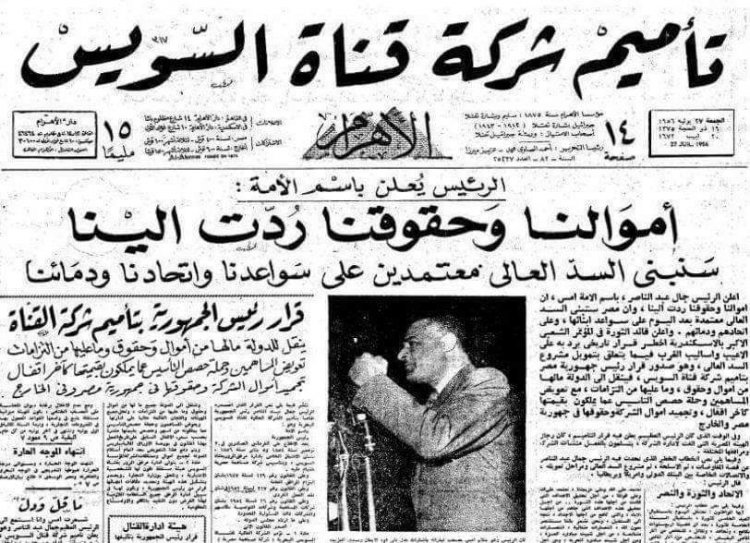Merits of the case of the nationalization of the Suez Canal

Although I am not inclined to discuss theoretical postulations, I have decided to share a part of a recent conversation that took place with a friend ...
• Friend : Would Abdel Nasser have been able to nationalize the Suez Canal if your father had not discovered the original firman of the concession contract proving that the Suez Canal Company was Egyptian and not Foreign?
• Me : Nasser could have announced the nationalization of the Suez Canal. However, in the absence of the legal basis, the dispute on the nationalized company would have turned into a question of usurpation of the rights of shareholders in a non-Egyptian corporation. Or in other words : a takeover... For instance, it is inconceivable to nationalize the German company Siemens or other global companies because they are non-Egyptian companies.
• Friend : The rights of the shareholders have already been usurped by the nationalization of the Suez Canal !
• Me : Nationalization is a process carried out every day in all countries of the world, and its legal merit is to transfer a major economic industry from private to State ownership in order to serve the public interest. The condition for nationalizing any major branch of an industry lies in the fair compensation for the loss of the net worth of the shareholder’s seized assets, which was the case in the nationalization of the Suez Canal by consensus after long negotiations. And for the record, Nationalization can sometimes save the future of some companies if they are economically distressed.
• Friend : If the nationalization of the Canal Company was legal, why did United Kingdom and France, in response, carry out an attack on Egypt to regain control of the Canal ?
• Me : The Canal company declared at the time that it was adversely affected by the tripartite aggression and that it wasn’t liable for the military attack ... The real motives behind the aggression were not the restoration of sovereignty over the Suez Canal. However, the motives were purely political, according to the memoirs of the British Foreign Minister Anthony Nutting who resigned, as well as of the French Foreign Minister Christian Pineau. Both of them made it clear that France wanted to eliminate Abdel Nasser because of his support to the Algerian revolution. Minister Eden also loathed Abdel Nasser for opposing the 1955 Baghdad Pact, which Britain supported with the goal of strengthening its power in the Middle East ... The nationalization of the Suez Canal was not the real reason behind the military attack on Egypt.
• Friend : Would a military attack by France on Egypt have eliminated President Abdel Nasser, who supported and armed the Algerians?
• Me : The recorded confessions of the head of the French intelligence service at the time, which were broadcasted by "France Inter" a few years ago (available on the Internet), confirm that the French intelligence service has attempted, since the end of 1954, several times to assassinate Gamal Abdel Nasser. They even resorted to poisoning him with the help of someone close to him. They even made arrangements for an alternative ruler to govern in case the assassination had succeeded. After six failed attempts and waiting for the right time, France alongside with the United Kingdom carried out a military attack on Egypt.
• Friend : So, Nasser gave them good reasons to carry out a military attack on Egypt!
• Me : Yes, even before the the Suez crisis, the former colonial Powers attempted to eliminate Nasser because of his support to the liberation movements in the Third World, according to his stated positions at the Bandung Conference in 1955 ... If Nasser hadn’t extended the development projects outside the Egyptian State, if he had agreed to adhere to the Baghdad Pact, if he had accepted Israel’s right to exist without interfering or advocating for the Palestinians’ rights, if he hadn’t attempted to arm the Egyptian army, and if had consented to the foreign sovereignty over the Suez Canal, the tripartite aggression could have been avoided.
By: M. Ali el-Hefnawy
